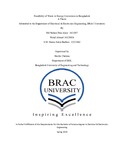| dc.contributor.advisor | Chakma, Shoilie | |
| dc.contributor.author | Alam, Md Nahian Ibne | |
| dc.contributor.author | Ahmed, Wakil | |
| dc.contributor.author | Badhon, S.M. Shams Islam | |
| dc.date.accessioned | 2018-11-15T05:34:48Z | |
| dc.date.available | 2018-11-15T05:34:48Z | |
| dc.date.copyright | 2018 | |
| dc.date.issued | 2018-04-17 | |
| dc.identifier.other | ID 1421057 | |
| dc.identifier.other | ID 14321026 | |
| dc.identifier.other | ID 12221062 | |
| dc.identifier.uri | http://hdl.handle.net/10361/10854 | |
| dc.description | This thesis is submitted in partial fulfilment of the requirements for the degree of Bachelor of Science in Electrical and Electronic Engineering, 2018. | en_US |
| dc.description | Catalogued from PDF version of thesis. | |
| dc.description | Includes bibliographical references( page 44-49). | |
| dc.description.abstract | Bangladesh is one the fastest developing countries with lots of opportunities due to its rich natural resources and human power. With the governments vision of digital Bangladesh the usage of electronic equipment is increasing day by day. Not only that due to huge population in the capital city Dhaka the wastage is increasing day by day. According to various sources the current population of Dhaka city is around 14.7 million. The total amount of waste developed in Dhaka city per day is around 4,634.52 tons. The contributions of different sectors to the total generation of Dhaka city, where nearly 76% of generated waste came from the residential sector, 22% came from the commercial sector, 1% from the institutional sector and rest from other sectors. The per capita waste generation rate is computed as 0.56 kg/capita/day. And it will increase more day by day. It is estimated that around 2030 the per capita waste will be around 0.78 kg per day.
Given its increasing population trend, rapid expansion of urban areas, and scarcity of land due to very dense population, Dhaka needs a solution to its rapidly going solid waste management problem. The solution needs to be cost effective, sustainable, useful, climate change impacts and etc. Waste-to-energy (WtE) is a strategy that is effective, environmentally sound, and economically beneficial.
There are many ways to produce energy from waste. For example direct combustion, gasification, pyrolysis, composting, plasma arc, refused derived fuel etc. The feasible methods for Dhaka city would composting that is Biogas, also direct combustion and pyrolysis. Along with that the important part is how to manage the electronic wastes. | en_US |
| dc.description.statementofresponsibility | Md Nahian Ibne Alam | |
| dc.description.statementofresponsibility | Wakil Ahmed | |
| dc.description.statementofresponsibility | S.M. Shams Islam Badhon | |
| dc.format.extent | 49 pages | |
| dc.language.iso | en | en_US |
| dc.rights | BRAC University theses are protected by copyright. They may be viewed from this source for any purpose, but reproduction or distribution in any format is prohibited without written permission. | |
| dc.subject | Waste energy | en_US |
| dc.subject.lcsh | Waste products as fuel. | |
| dc.subject.lcsh | Recycling (Waste, etc.) | |
| dc.subject.lcsh | Refuse as fuel. | |
| dc.title | Feasibility of waste to energy conversion in Bangladesh | en_US |
| dc.type | Thesis | en_US |
| dc.contributor.department | Department of Electrical and Electronic Engineering, BRAC University | |
| dc.description.degree | B. Electrical and Electronic Engineering | |

